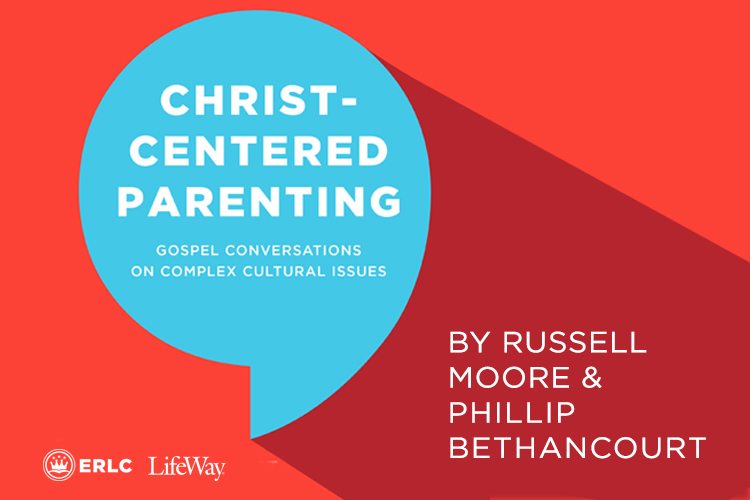
The following is an excerpt from Russell Moore and Phillip Bethancourt’s new study, Christ-Centered Parenting. This study is uniquely structured to help parents, grandparents, and mentors navigate the tough topics of today with their children. Whether your kids are preschoolers, high schoolers, or young adults, find ways to tackle cultural issues with a gospel lens. Order your copy or see a free sample today at Lifeway.com/ChristCenteredParenting. You can also pick up a copy at your local Lifeway Store!
Safety Is a Myth
We live in a world of immense human conflict—war, terrorism, school shootings. The world is unpredictable, and the idea that we could protect our kids from every evil thing is a placid myth at best and a destructive lie at worst. If we are truly basing our approach to parenting on the gospel, then we should raise the banner of the Great Commission as our parenting mantra. Think about this for a moment. What if in a world of warring nations, economic challenges, and many faiths, we equipped our kids to follow the Great Commission (Matt. 28:19-20)? What if we did this, knowing they won’t always be safe, but trusting that Jesus is always with them just as He promised?
If we are truly gospel people, we will be motivated to move beyond our safety and comfort to address the issues of our day. Of course we will teach our children about culture from the safety of our homes and churches, but it doesn’t stop there. When we shift our efforts from protecting to equipping, our kids will begin to see the world they are called to love through the lens of the gospel. They will see those who are different as neighbors rather than enemies. And they will no longer view the culture as entirely evil, but as a medium through which God’s kingdom can advance.
Living faithfully in a diverse society means holding fast to the truth of Scripture that Jesus Christ is the only hope for this world, while at the same time loving your neighbor as yourself. If we truly live with the gospel as our lens, we will not view the culture as something to be tolerated or despised. We will see a world of people in need of redemption. We will not shy away from difficult conversations, because we will see people at the heart of these conversations, people made in the image of God who are in need of a Savior. Imagine our children caring for victims of human trafficking, speaking up for the unborn, and defending biblical marriage. Imagine them loving “the least of these” (Matt. 25:40)—those in prison, those displaced by the injustices of war, and those friends who are ready to give up on life because they have no hope.
One of the most difficult tensions is raising our children to love sinners on the one hand and yet live their lives in Spirit-directed holiness on the other hand. This is a delicate balance. The best way forward is for us as parents to think about the culture we create in our homes and churches. If your child is trying to determine how to truly love sinners and walk in holiness, he or she will likely begin by looking at you. Our lives should always point our children toward Jesus, His kingdom, and the mission He has given us.
How do we do this? One answer is to constantly have these conversations in our homes. Ask your kids, What is our mission on this earth? Why are we here? Is our goal to look good or to love others into the kingdom? Our children are just like us. They need to be reminded of their own desperate need for the gospel all the time; they need to be reminded that the world needs the gospel too, all the time.
Jesus loved sinners. He ate with them, spent time with them, and engaged in long conversations with them. Jesus courageously opposed sin, but His heart was always brimming with love for the world. If we want our children to love like Jesus, we have to love like this too.
We can learn to love others in this way because at the root of our differences, we all have something in common: “For all have sinned and fall short of the glory of God” (Rom. 3:23).
The root of conflict in our world is not our ethnic differences, religious differences, or even our cultural differences. The root of the problem of human conflict is sin. The gospel is an invitation to be reconciled. As those who have been reconciled to Christ and have peace with God, we now are tasked with “the ministry of reconciliation” (2 Cor. 5:18). Mission is a matter of reconciliation, the reconciliation of humanity to God and of humanity with one another.
We are talking about the kingdom of God. We teach our children to participate in the mission of reconciliation because there are millions who do not yet know Jesus as Lord. There will come a day when “every knee will bow … and every tongue will confess that Jesus Christ is Lord” (Phil. 2:10-11) whether they made that confession in this life or not. All will stand before the judgment seat of God to “give an account” (Rom. 14:10-12) and will either spend eternity in communion with Christ or eternity apart from Him. All things will be made known. All differences will be set aside. All wrongs will be made right. May God help us.
Adapted from Christ-Centered Parenting: Gospel Conversations on Complex Cultural Issues by Russell Moore and Phillip Bethancourt

